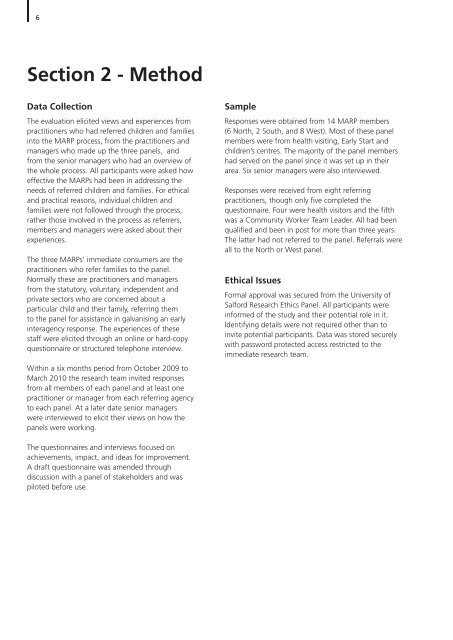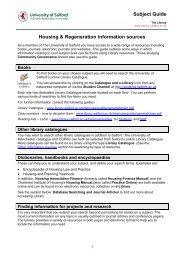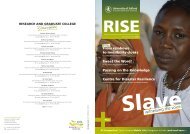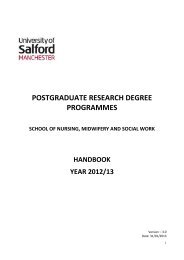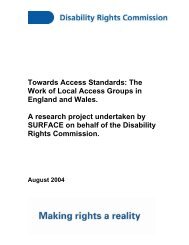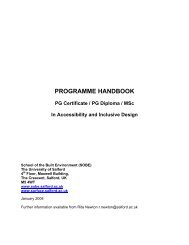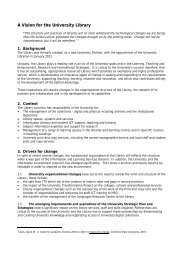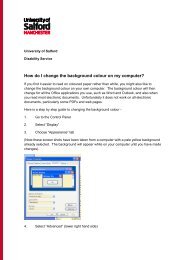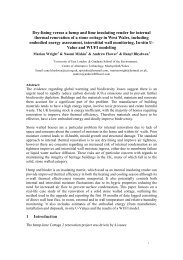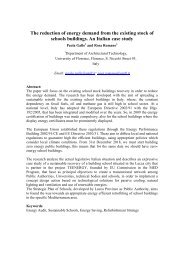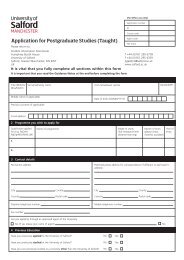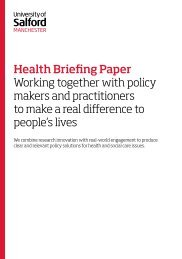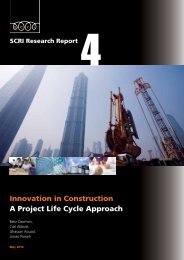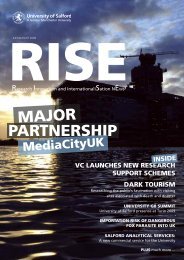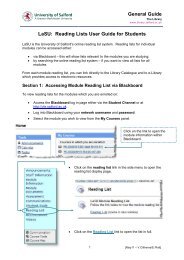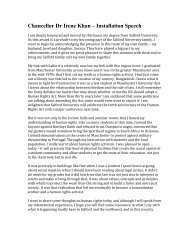FINAL REPORT - University of Salford
FINAL REPORT - University of Salford
FINAL REPORT - University of Salford
Create successful ePaper yourself
Turn your PDF publications into a flip-book with our unique Google optimized e-Paper software.
6<br />
Section 2 - Method<br />
Data Collection<br />
The evaluation elicited views and experiences from<br />
practitioners who had referred children and families<br />
into the MARP process, from the practitioners and<br />
managers who made up the three panels, and<br />
from the senior managers who had an overview <strong>of</strong><br />
the whole process. All participants were asked how<br />
effective the MARPs had been in addressing the<br />
needs <strong>of</strong> referred children and families. For ethical<br />
and practical reasons, individual children and<br />
families were not followed through the process,<br />
rather those involved in the process as referrers,<br />
members and managers were asked about their<br />
experiences.<br />
The three MARPs’ immediate consumers are the<br />
practitioners who refer families to the panel.<br />
Normally these are practitioners and managers<br />
from the statutory, voluntary, independent and<br />
private sectors who are concerned about a<br />
particular child and their family, referring them<br />
to the panel for assistance in galvanising an early<br />
interagency response. The experiences <strong>of</strong> these<br />
staff were elicited through an online or hard-copy<br />
questionnaire or structured telephone interview.<br />
Within a six months period from October 2009 to<br />
March 2010 the research team invited responses<br />
from all members <strong>of</strong> each panel and at least one<br />
practitioner or manager from each referring agency<br />
to each panel. At a later date senior managers<br />
were interviewed to elicit their views on how the<br />
panels were working.<br />
Sample<br />
Responses were obtained from 14 MARP members<br />
(6 North, 2 South, and 8 West). Most <strong>of</strong> these panel<br />
members were from health visiting, Early Start and<br />
children’s centres. The majority <strong>of</strong> the panel members<br />
had served on the panel since it was set up in their<br />
area. Six senior managers were also interviewed.<br />
Responses were received from eight referring<br />
practitioners, though only five completed the<br />
questionnaire. Four were health visitors and the fifth<br />
was a Community Worker Team Leader. All had been<br />
qualified and been in post for more than three years.<br />
The latter had not referred to the panel. Referrals were<br />
all to the North or West panel.<br />
Ethical Issues<br />
Formal approval was secured from the <strong>University</strong> <strong>of</strong><br />
<strong>Salford</strong> Research Ethics Panel. All participants were<br />
informed <strong>of</strong> the study and their potential role in it.<br />
Identifying details were not required other than to<br />
invite potential participants. Data was stored securely<br />
with password protected access restricted to the<br />
immediate research team.<br />
The questionnaires and interviews focused on<br />
achievements, impact, and ideas for improvement.<br />
A draft questionnaire was amended through<br />
discussion with a panel <strong>of</strong> stakeholders and was<br />
piloted before use.


